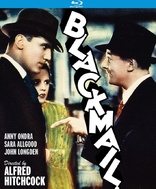Blackmail Blu-ray Movie
HomeBlackmail Blu-ray Movie 
Kino Lorber | 1929 | 1 Movie, 2 Cuts | 84 min | Not rated | Aug 13, 2019Movie rating
6.8 | / 10 |
Blu-ray rating
| Users | 0.0 | |
| Reviewer | 3.0 | |
| Overall | 3.0 |
Overview
Blackmail (1929)
A shopkeeper''s daughter fights off blackmail after she kills a young artist who had tried to rape her.
Starring: Anny Ondra, Sara Allgood, Charles Paton, John Longden, Donald CalthropDirector: Alfred Hitchcock
| Crime | Uncertain |
| Thriller | Uncertain |
Specifications
Video
Video codec: MPEG-4 AVC
Video resolution: 1080p
Aspect ratio: 1.33:1
Original aspect ratio: 1.2:1, 1.33:1
Audio
English: DTS-HD Master Audio 2.0 Mono (48kHz, 16-bit)
Music: DTS-HD Master Audio 2.0
Subtitles
English SDH
Discs
Blu-ray Disc
Two-disc set (2 BDs)
Playback
Region A (locked)
Review
Rating summary
| Movie | 4.5 | |
| Video | 3.0 | |
| Audio | 3.0 | |
| Extras | 3.0 | |
| Overall | 3.0 |
Blackmail Blu-ray Movie Review
The silent version looks incredible - the sound version disastrous
Reviewed by Neil Lumbard September 18, 2019Blackmail marks two significant moments in cinema history: Alfred Hitchcock's final silent feature film and his first talkie production (which is largely cited as the first sound film ever made in Great Britain). Both versions are included on the Blu-ray release from distributor Kino Lorber. Both are historically significant and its fascinating to compare the two different versions of the production.
The young and beautiful Alice White (Anny Ondra) is involved with MPS Detective Frank Webber (John Longden), her boyfriend. Things in their relationship start to shake up in unexpected ways when she decides to go out on a date with an artist (Cyril Ritchard), someone who draws on canvas. After their night together he attempts to assault her and she murders him with a knife in self defense. This horrific event shifts in a new direction when someone starts to blackmail her over the incident.
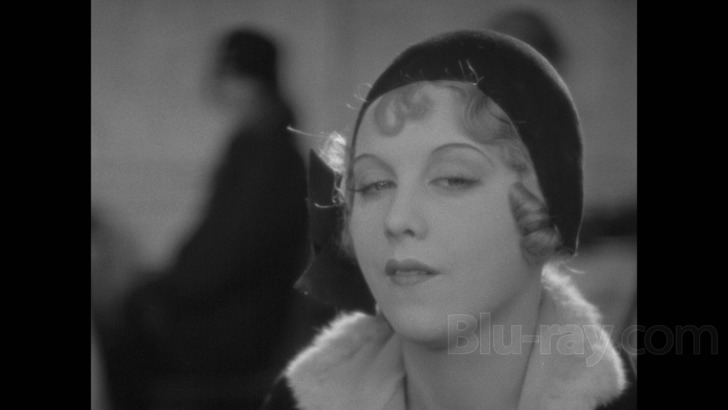
One step forward. Two steps back. One beautiful restoration. Two botched scans.
The great Alfred Hitchcock (Psycho, North by Northwest, Vertigo) showcases his artistic genius in both versions of the film. Based on the play from Charles Bennett (Foreign Correspondent, The 39 Steps), featuring adaptation by Hitchcock and dialogue from Benn W. Levy (Waterloo Bridge, Evergreen). Featuring cinematography by Jack E. Cox (The Lady Vanishes, East of Shanghai), Blackmail is a visually impressive artistic achievement which lands as one of the most interesting early Hitchcock features. It is also a great showcase for the charm of leading actress Anny Ondra.
Both versions have their own distinctive artistic merits. The silent version offers Hitchcock at his most visually compelling and there is something unique about this version which makes it feel special. The talkie version is also fascinating and it's a joy to actually be able to hear the actors in their respective parts. From a historical significance, Blackmail feels like something particularly essential in cinema history: through it's two versions it shows audiences the stark differences between the two styles of filmmaking as cinema started to shift into a new direction with the dawn of talkies. Watching these two different versions back-to-back provides viewers a glimpse at what cinema once was and what it would become. An essential Hitchcock feature.
Blackmail Blu-ray Movie, Video Quality 
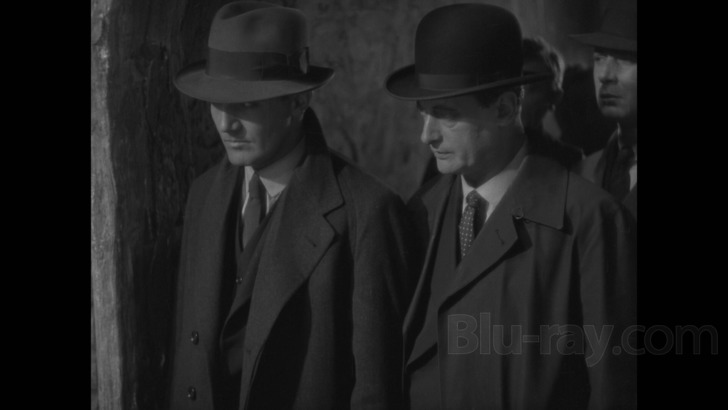
Let me start with the good news regarding this release (yes, there is some). The silent film version has been beautifully restored by BFI and it's apparent that a lot of love and care went into the restoration efforts for preserving the film. It is presented in 1.33:1 full frame. The Kino Blu-ray release capably presents the silent version of Blackmail and it has significantly improved definition and clarity. The presentation is provided in 24 fps and looks lovely.
Fans of the silent film version of this Hitchcock classic are going to be quite thrilled with the visual upgrade and the benefits this high definition presentation offers. The print is almost pristine (in some ways shockingly so when one considers the age of the elements) with little to no signs of wear to the print. Few scratches are on the transfer at all. Though black levels might not be as inky black as desired (one of my few reservations with the restoration) the overall level of attention that was given to the restoration is impressive and is hard to dismiss. Hitchcock fans will be pleased with the silent presentation, through and through.
Now for some news that isn't quite so much fun: unlike the impressive restoration effort undertaken for the silent film version (as restored by the BFI) the talkie version has not received the same degree of love and attention to detail. This release does not include a quality preservation of the talkie version. That is the blunt way of putting it.
According to IMDB, the original aspect ratio for the sound version is 1.2:1. Kino presents this version on disc one as the "sound version" of the film. However, Kino did not properly transfer the feature and its clear that there is a problem with the aspect ratio on the presentation. The image appears somewhat stretched on the first disc to 1.33 and the feature is somewhat wider than anticipated.
In order to try and counter this quality control issue, Kino opted to include another disc in the release for the 1.2:1 aspect ratio of Blackmail to resolve the problem on disc one (rather than further delay and repress disc one). Only the second disc essentially replicates the same problem (only flipping the way the image is stretched - now the actors appear too tall and thin), squeezed into 1.12.
If the image aspect ratio issue on the talkie version wasn't the only downside to its presentation, the fact that the image is also considerably less beautiful than the silent restoration is worth pointing out. It's all too obvious that the talkie has not been well preserved and there are many specks of dirt and scratches on this transfer. While I would say the talkie presentation on disc one might moderately "watchable" for some (even if it is absolutely incorrect with regards to film preservation) the second disc is a completely pointless exercise attempting to fix an issue and only making it worse.
Please note that screenshots #1-#15 are of the silent film version restored by BFI. Screenshots #17-#26 are from the first presentation (included on disc one) of the talkie version. Screenshots #27-#36 are from the talkie version provided on Disc 2.
Should Kino ever reach out about a replacement program for the talkie version this review will be updated.
Blackmail Blu-ray Movie, Audio Quality 
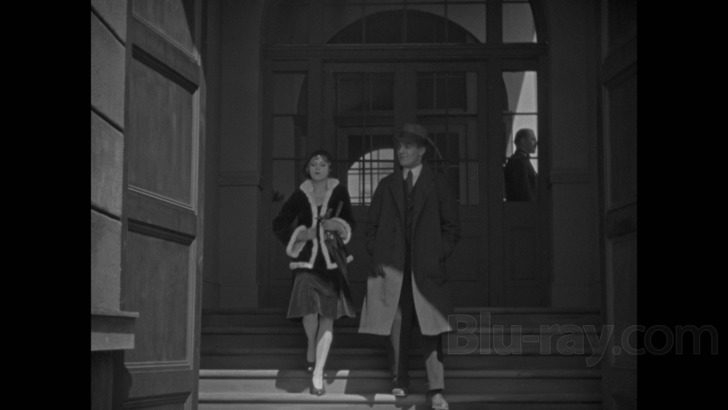
There are differences between the audio presentations as well. Besides the obvious differences (one is silent and one features sound), the audio track on the silent presentation features a new score by the Mont Alto Motion Picture Orchestra. The clarity and detail on this lossless track is superb and will please viewers. The music score is a great accompaniment and fits the filmmaking well. The sound version is another story. The audio sounds hollow with poor clarity and definition. Dialogue sounds scratchy and thin. It's nowhere near as impressive. Optional English subtitles are provided.
Blackmail Blu-ray Movie, Special Features and Extras 
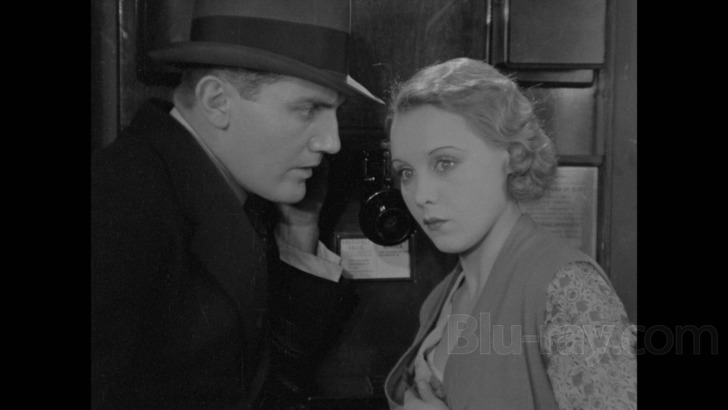
Much to my amusement, Kino Lorber lists the "silent version of Blackmail" as a bonus feature on the packaging. As far as I am concerned, the silent version is the main feature. If the sound version was supposed to be the primary presentation for this release then why wasn't it shown more love and care?
Audio Commentary by Film Historian Tim Lucas
Hitchcock/Truffaut: Icon Interviews (10:27) is an audio only interview featuring Hitchcock delving into his process as a filmmaker.
Introduction by Noel Simsolo (SD, 6:28) is a insightful interview about the production which provides viewers with some interesting notes on the feature-film.
Anny Ondra's Screen Test (SD, 00:59) showcases the lead actress in a screen test for Blackmail.
Blackmail Trailer (HD, 1:15)
Lastly, the release also includes trailers for the following Kino Lorber Hitchcock releases: Murder! (HD, 1:12), The Paradine Case (SD, 1:43), Under Capricorn (SD, 2:04), and Lifeboat (HD, 1:28).
Blackmail Blu-ray Movie, Overall Score and Recommendation 
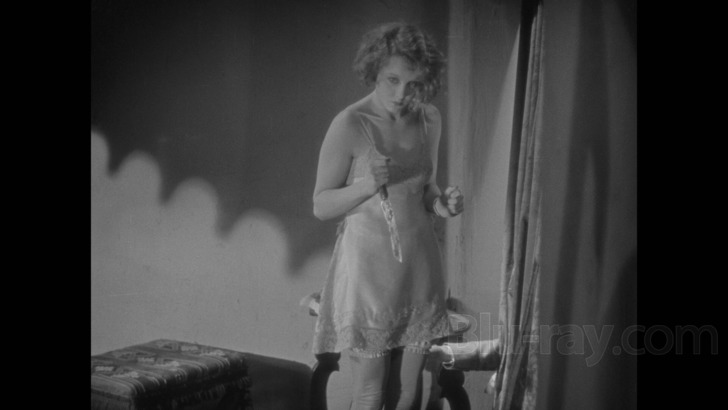
Blackmail is an entertaining Hitchcock gem that deserves recognition for its importance in cinema history. It was the last silent feature that Hitchcock ever produced and the first talkie ever made in Britain. The Blu-ray release of Blackmail offers mixed- results: while the silent film version has a beautiful restoration from BFI the talkie looks comparatively lackluster and the aspect ratio was botched. The release is worthwhile for the silent film but fans of the talkie might feel otherwise.
Similar titles
Similar titles you might also like

Number Seventeen
1932

Four Flies on Grey Velvet 4K
4 mosche di velluto grigio
1971

The Lodger: A Story of the London Fog
1927

Murder!
1930

A Hard Day
끝까지 간다
2014

I Confess
Warner Archive Collection
1953

Buffet Froid
Cold Cuts
1979

Homicide
1991

The Iguana with the Tongue of Fire
L'iguana dalla lingua di fuoco
1971

The Big Sleep
1978

Experiment in Terror
1962

The Stone Killer
Limited Edition to 3000
1973

The Connection
La French
2014

Mortal Thoughts
1991

Creepy
Slipcover in Original Pressing
2016

The 39 Steps
1935

Twilight
1998

Badge 373
1973

Violent Cop
その男、凶暴につき
1989

Killer Cop
La polizia ha le mani legate
1975
